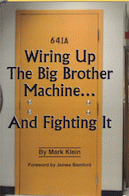This is the second installment of my interview with Mark Klein, the AT&T/NSA whistleblower. [Read part one here.]
JB: When we broke, I was asking if what you meant was that 9/11 was at least in part a pretext to do what the government wanted to do all along, spy on all of its citizens. Please answer that as well as how 9/11 affects the intrinsic illegality of what's being done now on an everyday basis, without the benefit of subpoenas or court orders. Am I naive to be bent out of shape about this?
MK:You should be aware that the government had approached the phone companies to get the ability to intrude onto their networks before 9/11, but encountered some resistance. For instance, it came out later that Qwest had been approached in early 2001, but turned down the government because their lawyers decided it was illegal.
It takes some big events, some crisis, to give the government the political atmosphere, if you can call it that, to override the previous understanding of what is legal and within normal boundaries. As some politicians have often said, "never let a good crisis go to waste." And an attack on the country and some kind of war allow the government to simply assume powers it normally could not grab without a backlash. In an atmosphere of war, the laws become suspended, even cancelled. And Bush made full use of that atmosphere, while much of the liberal opposition sank into silence for fear of being called "unpatriotic". Thus Congress quickly passed the so-called "Patriot Act" in October 2001, a humongous compilation of dangerous powers given to the government, shredding much of the Constitution and opening the door to mass domestic surveillance on an unprecedented scale. The invocation of a "national emergency" to give government extreme power is an old political trick that goes back centuries.

Mark's book with his photo of the secret door at AT&T, Folsom Street
(Image by Mark Klein) Details DMCA
JB: Qwest's refusal to work with the government cost them dearly, didn't it? AT&T, on the other hand, had fewer scruples. Tell us more about how those very different responses played out, please.
MK: Shortly after Qwest's refusal, they lost a government contract worth hundreds of millions of dollars, and their stock price dropped severely. A few years later, their CEO, Joseph Nacchio, was brought up on insider trading charges, and at his trial, Nacchio revealed the 2001 episode and argued that everything since then was the result of government retribution.
AT&T had a historic advantage over everyone else: they were the original phone company, starting as a government-sanctioned monopoly which had a cozy relationship with the government for most of the last century. They also had a close, and secret, relationship with the Pentagon in the name of "national security." One little-known fact, for instance, is that back in the '60s and '70s, when the Cold War was still hot and the threat of nuclear war loomed, AT&T had a secret agreement with the Pentagon to "harden" their key installations against the Electro-Magnetic Pulse (EMP) produced by nuclear detonations, which could fry electronic equipment. The tremendous cost for this extra construction was secretly built-in to customers' telephone bills.
The latest New York TImes/ProPublica revelations, based on Snowden's documents, reveal that AT&T's surveillance agreement with the government goes back to 1985, way before 9/11, though the article does not specify what exactly was involved in that earlier episode. In any case, I know that when I worked for the company, they benefited from many government contracts, reflected by the internal listings for many jobs available which required a security clearance. So it's not surprising that the latest revelations quotes NSA documents describing its relationship with AT&T as "highly collaborative" and lauds the company's "extreme willingness to help."
JB: "Extreme willingness to help", indeed. I'd like to hear more about your whistleblowing, Mark.
MK: I didn't do anything in 2003 when I found the secret room but when I retired in 2004, I took the documents with me. It was still too scary politically to come forward, but in December 2005, the New York Times came out with a blockbuster article revealing that the Bush administration had been doing "warrantless wiretapping" with the help of the major phone companies. I knew I had the evidence on that, and I thought the article would give me more credibility with people.
I approached the Electronic Frontier Foundation in January 2006. They specialize in civil liberties cases involving the internet, so they were very excited to see me. Within a couple of months, they asked for my documents and filed a lawsuit against AT&T. Thus started a years-long battle which took me to Washington.
As for the media, I happened to bump into an eager reporter for the Los Angeles Times, and we spent several weeks in February preparing what promised to be a big front-page spread. But after their "top guy" talked to the Director of National Intelligence (John Negroponte at the time) and also General Hayden, head of the NSA, about the forthcoming article, they suddenly killed it without explanation.
So I went to the New York Times and spoke to James Risen and Eric Lichtblau, and in April 2006, the Times did publish an article in which four experts confirmed that my documents were evidence of illegal wiretapping. Then came a flood of media calls; the story was out there.
(Note: You can view every article as one long page if you sign up as an Advocate Member, or higher).







